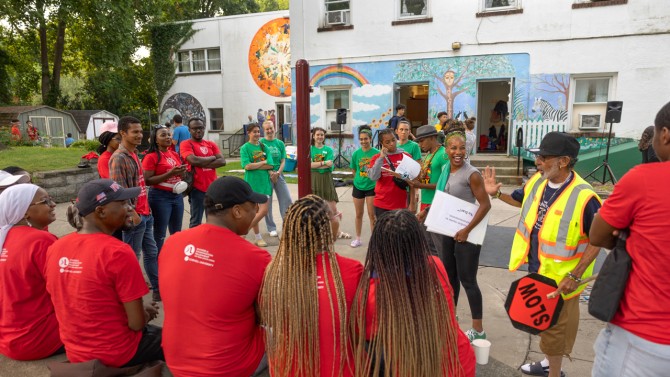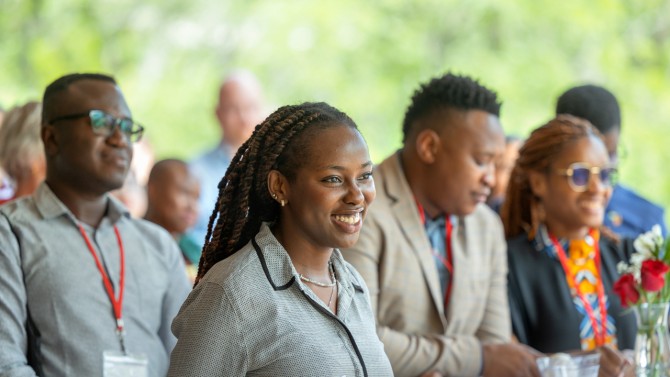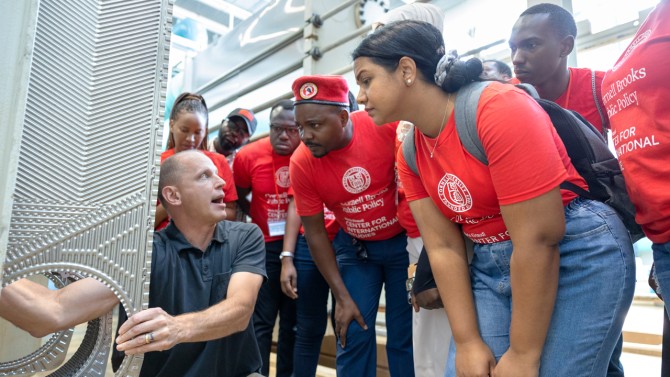When Alice Igisaro began practicing as a dental surgeon in her native Rwanda in 2020, she was immediately frustrated by the number of patients with advanced disease - they hadn't sought help in time or had gone first to traditional healers, or they had not been properly referred by their community health centers.
Igisaro saw solutions - educating rural communities and health workers - and began pursuing changes that would have systemic impact. But as a clinician, she felt isolated and stymied by expectations that, especially as a young woman, she accept the status quo.
Fellows interact with students and staff from the Community Unity Music Education Program on Nelson Mandela International Day, July 18.
After spending the last six weeks at Cornell as a Mandela Washington Fellow, Igisaro said she's found new confidence in herself and hope for her country and the continent. The Mandela Washington Fellowship for young African leaders is sponsored by the U.S. Department of State; this summer a cohort of 25 Fellows was hosted by the Cornell Jeb E. Brooks School of Public Policy and the Mario Einaudi Center for International Studies.
"When you see other young people who are hopeful, who are working toward something, it gives me so much hope," Igisaro said. "Now I know I'm not the only one, and now I have networks - in the U.S. and in Africa. I really believe in our future collaboration and the strength of how people think in our cohort. I believe in us as young leaders of Africa."
The 25 Mandela Fellows represent countries from all over sub-Saharan Africa. They have experience and concentrations in three broad disciplines: climate and sustainability, government and public health. Cornell is one of nine schools offering a track in public management.
"This institute represents the best of what the Brooks School can bring to bear, in terms of expertise around public management, vulnerability and resilience planning, infrastructure policy, and citizen engagement," said Colleen Barry, dean of the Brooks School. "It also furthers our mission of bringing about positive change in the world by developing partnerships that will expand our global research, teaching and engagement profiles."
"Our core mission is education for a global world," said Rachel Beatty Riedl, director of the Einaudi Center and the center's John S. Knight Professor of International Studies, as well as professor in the College of Arts and Sciences and the Brooks School. "We seek to equip our students with the skills, knowledge base and critical thinking to address the challenges we face today and in the future. The Mandela Washington Fellows program is built upon that ethos, and the fellows are truly inspirational in their commitments and contributions. Our Cornell community and Ithaca community benefit from the bright light they shine."
Cornell is one of 28 U.S. institutions - and the only Ivy League school - to host this year's Mandela Washington Fellowship, the flagship program of the State Department's Young African Leaders Initiative, with a total of 700 African leaders between the ages of 25 and 35 participating this summer. The State Department has supported nearly 5,800 fellows since 2014. This is the first year Cornell has received the award and hosted a group of fellows.
Cornell's fellows had a packed schedule of intense academic coursework, leadership training, networking and volunteering, as well as meetings with faculty, alumni and graduate student mentors, elected officials, university administration and community leaders.
Fellows said the interdisciplinary coursework and their peers broadened their perspectives.
"I've learned to be very open-minded and to think outside the box," said Kelebogile Lefhoko, a medical doctor from Botswana. "Literally everything we've talked about affects health - climate, sustainability, government. These are things we didn't get to talk about in medical school."
Fellows also said having the chance to develop themselves as leaders, to identify their strengths, was revelatory.
"Just noticing how you as a person are a resource - it's life-changing," Lefhoko said. "Outside of any external resources, I have my own strengths as a leader, which are a resource all their own. That will definitely guide me in anything that I do."
Mentors helped fellows develop focus projects to implement upon returning to their home countries; Igisaro will leverage existing health care infrastructure to train health care workers who have direct access to rural communities. Lefhoko plans to work with a support group for patients with autoimmune diseases to elevate research and find the best ways to advocate for patients.
"We want to accomplish more for our continent, to create strategies to really address the pressing issues: climate change, gender inequality, health access, good governance, financial stability," said Jonathan Mickaël Andréas, a climate and sustainability fellow and government official from Madagascar. "Those are pressing issues that I think all African countries can relate to."
Projects relating to sustainability include incentivizing the private sector to work towards climate change solutions, advocating for young people's involvement in climate discussions at the highest levels, and establishing a center for the study of climate change. Other efforts will focus on increasing community engagement and influence in policy discussions, infrastructure planning and elections.
"These fellows are changemakers," said Tom O'Toole, executive director of Brooks School public affairs programming. "They walk the walk in a very real and impactful way, which is very much aligned with Cornell's tradition of 'doing the greatest good.'"
On their forays into the community, fellows found inspiration all around them - they noted the innovation and resourcefulness of the Lake Source Cooling project, the appreciation for the region's history and indigenous peoples on display at the History Center of Tompkins County, and camp counselors' encouragement and empowerment of campers at the Community Unity Music Education Program.
Fellows also visited the Lab of Ornithology, Kendall Retirement Home, Ithaca City Hall, Fort Baptist Farm, the United Nations Headquarters and Africa Center in New York City and more. Outside of the scheduled programming, they explored waterfalls and trails, attended churches and the Al-Huda Islamic Center, and were invited into faculty's homes.
"Everywhere we went, it was a two-way exchange," said Anusha Seechurn, a climate and sustainability fellow and youth advocate from Mauritius. "A highlight was the interest and value people from Ithaca and the U.S. had for us back home. And also the willingness to learn how things are done in our country. Everyone was very interested in the work we do."
At the Lake Source Cooling facility, fellows learn about Cornell's efforts to reduce reliance on fossil fuels.
For Nelson Mandela International Day on July 18, the fellows visited the Greater Ithaca Activities Center and led a group of nearly 100 young campers in song and dance.
"I'm not really used to dancing or chanting," said Andréas. "But I think for me, personally, it's really a major change - you can't open up if your environment doesn't allow you to open up. This whole experience has allowed me to see that there's always something amazing to explore, to open up to and to see the differences in other people."
After their time in Ithaca, fellows traveled to Washington, D.C. to participate in a weeklong summit with all 700 of this year's Mandela Washington Fellows; they are networking with other fellows and hearing from U.S. leaders in the private, public and nonprofit sectors, capping a summer they said will have enduring impact on their work and lives.
"When you come to a place where people are like-minded, it reignites this thing in you, it brings back the spark," Lefhoko said. "There's so much uniqueness in where we come from, what we stand for, but there's this similarity that we all are excited to do something for our continent and for the world. This program, it frees you and teaches you to think independently - and to see that the possibilities are truly endless."
The Mandela Washington Fellowship is funded by the U.S. Department of State's Bureau of Educational and Cultural Affairs and supported in its implementation by IREX.









